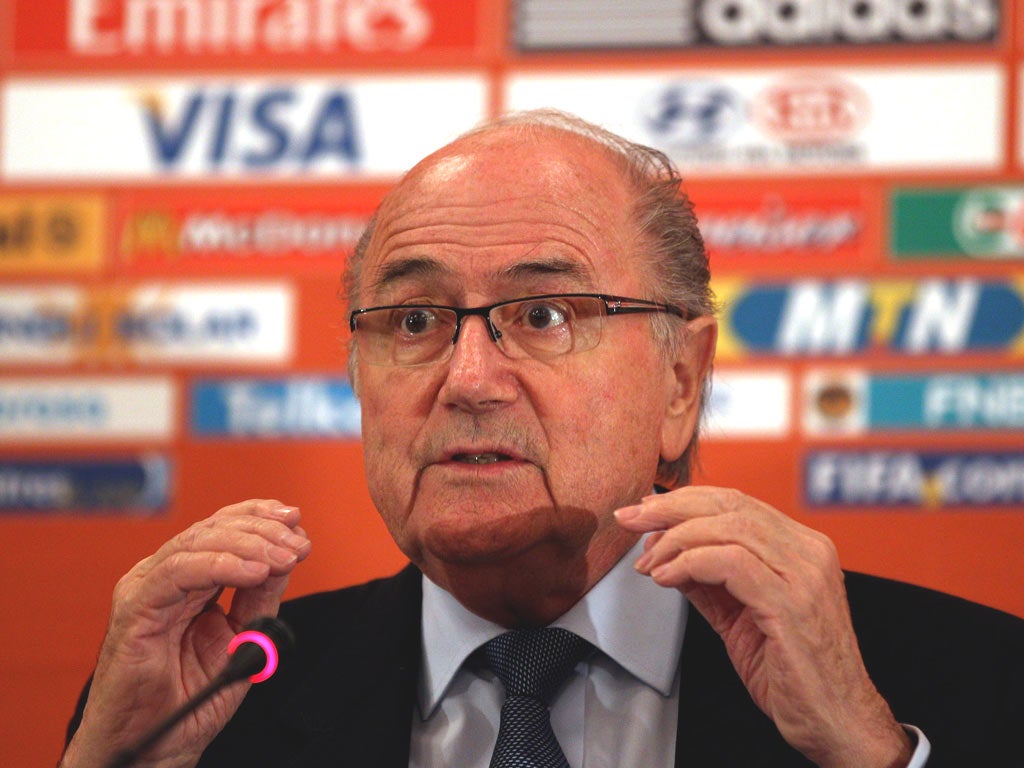Sam Wallace: Fifa's sponsors out of touch with fans and reality

At the World Cup finals in South Africa last year you could hardly move for the corporate messages that bombarded every level of your consciousness until you were waking in the middle of the night with the tune from the Coca-Cola television commercial playing in your head.
After six weeks, "Wavin' Flag" by K'Naan – the soundtrack to said advert – was so engrained in my psyche I thought I might need therapy to shift it. Oliver Tambo Airport in Johannesburg was festooned with Coca-Cola marketing livery and had attendants in arrivals to serve complimentary drinks.
Even in Africa, where there is a gloriously home-made feel to a lot of the Premier League football shirts you see, the footprint of the Fifa corporate partners was everywhere. These huge global entities – Adidas, Coca-Cola, Emirates, Hyundai, Sony, Visa – had their commercials played on stadium screens, on television, in airports.
The sponsors pay Fifa £15m a year to own the show. But the way in which they project themselves has shifted too. Advertising in football is no longer based exclusively around the famous players on the pitch, it targets the fan himself and his identity: his hopes, his fears, the car he drives and the beer he drinks. Not to mention the face paint and colourful wig without which no advertiser feels any representation of a supporter is complete.
What absorbs most fans? It varies, but last week you did not have to be Don Draper to identify the subject on everyone's mind. Sepp Blatter's comments on racism in general, and specifically that racist abuse should be resolved with a handshake, were not just headlines. The story led radio bulletins, websites and radio phone-ins for days. It pretty much pushed every button for a modern media news sensation.
A hurricane of outrage and disbelief, it drew other stories towards it, including the Terry-Ferdinand and Suarez-Evra cases. In its wake came John Barnes, who offered up the most prescient analysis. Gus Poyet was drawn in too. Blatter wiped everything off the football agenda and everyone had a view.
Everyone, that is, apart from those Fifa partners. While the rest of the country knew what they thought about Blatter, these behemoths of consumerism said nothing. Not quite nothing, but the responses, and non-responses, that I garnered from the six Fifa partners last week add up to very little. They are written in the constipated doublespeak of PR people, terrified a word out of place will spark a media firestorm.
These six firms are the forces that could effect change at Fifa. It was the case at the News of the World when advertisers started to pull out. If the sponsors were to add their voices to the calls for Blatter (left) to go, they could apply infinitely more pressure than the supporters to whom they sell cars, PlayStations and fizzy drinks.
The commercialisation of football is here to stay. It is how Wembley got built. It is how the Glazers pay their debts. It is as fundamental to the game as the ticketing and the broadcast revenue. It is easy to despise the corporate grip on football but one has to be realistic about what the game has become and these are multinational companies which provide employment and pay corporation taxes. But they were woefully out of touch with the mood last week.
Blattergate and the reaction it drew from people, from ordinary supporters to high-profile players, was a prime example of how, in the modern age, these global corporations that want football's reflected glory can be so off the pace. They are so timid to say what they actually think that they say nothing at all.
Corporate response: In their own words:
Emirates
'Emirates continues to closely watch developments within Fifa.'
Sony
'We are continuing to focus on our support of the 2014 World Cup and the ongoing development of the sport around the world.'
Adidas
'Adidas is totally opposed to racism in football.'
Coca-Cola, Hyundai, Visa
No response
Scouting for boys can be just too much too young
It was 10 years ago since a documentary fronted by Alan Hansen investigating the competition between clubs in buying young players focused on one of Spurs' latest recruits. John Megicks was six years old and had by then been featured in the national press.
Ten years on and The Sun reported last week that Manchester United have scouted a three-year-old boy, Charlie Jackson. There is something about these child prodigy stories that seems to capture people's imagination; they fall into the same category as those interviews with Lottery winners. It would be fascinating to know what has happened to Megicks and whether he thinks that all that early exposure did him any good.
Truth may be unwelcome to Bulgarians
At the end of England's 3-0 win over Bulgaria in Sofia on 2 September, Lothar Matthäus, then the team's manager – never a man noted for his humility – apologised on behalf of Bulgaria for the racially abusive chants from a minority of the home fans. It was a decent gesture. Matthäus was sacked two weeks later.
In the end, Bulgaria were fined the princely sum of £34,230 for their fans' behaviour. Over the weekend the Bulgarian football federation announced it was appealing against the decision and sending a delegation to Uefa to ask for an explanation. The key question being: what exactly is it the Bulgarians need explaining to them?
Subscribe to Independent Premium to bookmark this article
Want to bookmark your favourite articles and stories to read or reference later? Start your Independent Premium subscription today.

Join our commenting forum
Join thought-provoking conversations, follow other Independent readers and see their replies